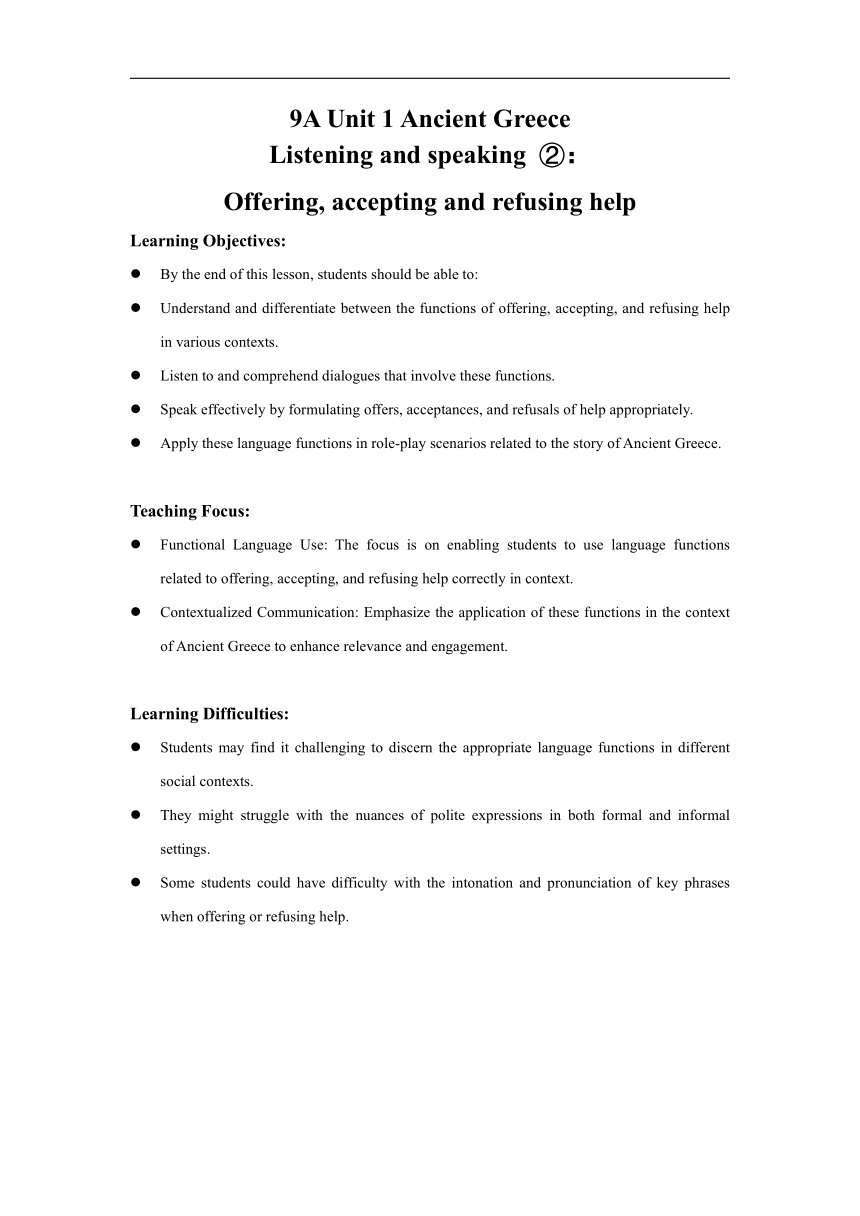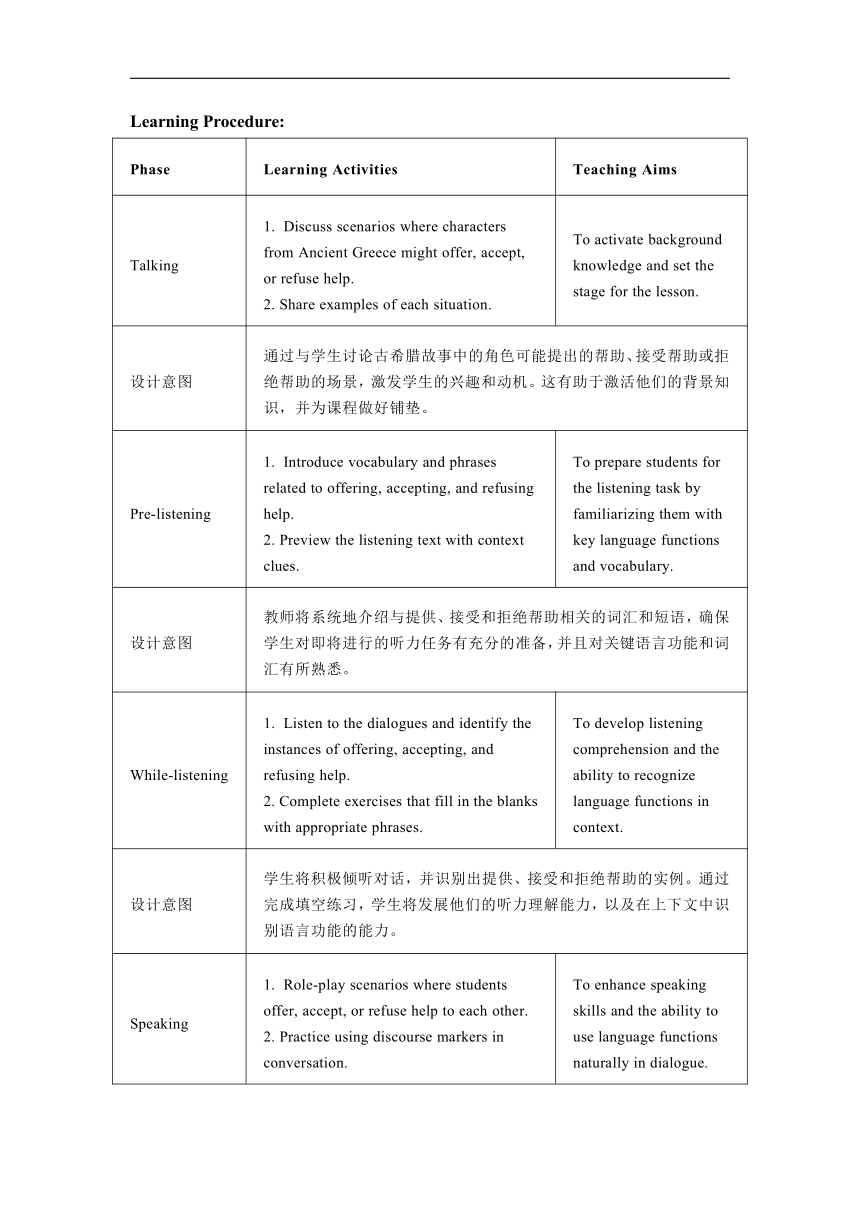Module1 Unit 1 Ancient Greece Listening and speaking ②教学设计 牛津上海版(试用本)九年级英语上册
文档属性
| 名称 | Module1 Unit 1 Ancient Greece Listening and speaking ②教学设计 牛津上海版(试用本)九年级英语上册 |  | |
| 格式 | docx | ||
| 文件大小 | 20.0KB | ||
| 资源类型 | 教案 | ||
| 版本资源 | 牛津上海版(试用本) | ||
| 科目 | 英语 | ||
| 更新时间 | 2024-08-12 15:08:49 | ||
图片预览


文档简介
9A Unit 1 Ancient Greece
Listening and speaking ②:
Offering, accepting and refusing help
Learning Objectives:
By the end of this lesson, students should be able to:
Understand and differentiate between the functions of offering, accepting, and refusing help in various contexts.
Listen to and comprehend dialogues that involve these functions.
Speak effectively by formulating offers, acceptances, and refusals of help appropriately.
Apply these language functions in role-play scenarios related to the story of Ancient Greece.
Teaching Focus:
Functional Language Use: The focus is on enabling students to use language functions related to offering, accepting, and refusing help correctly in context.
Contextualized Communication: Emphasize the application of these functions in the context of Ancient Greece to enhance relevance and engagement.
Learning Difficulties:
Students may find it challenging to discern the appropriate language functions in different social contexts.
They might struggle with the nuances of polite expressions in both formal and informal settings.
Some students could have difficulty with the intonation and pronunciation of key phrases when offering or refusing help.
Learning Procedure:
Phase Learning Activities Teaching Aims
Talking Discuss scenarios where characters from Ancient Greece might offer, accept, or refuse help. 2. Share examples of each situation. To activate background knowledge and set the stage for the lesson.
设计意图 通过与学生讨论古希腊故事中的角色可能提出的帮助、接受帮助或拒绝帮助的场景,激发学生的兴趣和动机。这有助于激活他们的背景知识,并为课程做好铺垫。
Pre-listening Introduce vocabulary and phrases related to offering, accepting, and refusing help. 2. Preview the listening text with context clues. To prepare students for the listening task by familiarizing them with key language functions and vocabulary.
设计意图 教师将系统地介绍与提供、接受和拒绝帮助相关的词汇和短语,确保学生对即将进行的听力任务有充分的准备,并且对关键语言功能和词汇有所熟悉。
While-listening Listen to the dialogues and identify the instances of offering, accepting, and refusing help. 2. Complete exercises that fill in the blanks with appropriate phrases. To develop listening comprehension and the ability to recognize language functions in context.
设计意图 学生将积极倾听对话,并识别出提供、接受和拒绝帮助的实例。通过完成填空练习,学生将发展他们的听力理解能力,以及在上下文中识别语言功能的能力。
Speaking Role-play scenarios where students offer, accept, or refuse help to each other. 2. Practice using discourse markers in conversation. To enhance speaking skills and the ability to use language functions naturally in dialogue.
设计意图 学生将通过角色扮演来实践提供、接受或拒绝帮助的对话,这有助于提高他们的口语技能,使他们能够在对话中自然地使用语言功能,增强自信和流利度。
Assignments Complete additional listening and speaking exercises from the workbook. 2. Create and act out a new scenario involving help in the context of Ancient Greece. To reinforce learning and extend practice beyond the classroom, encouraging creative application of language functions.
设计意图 通过完成额外听力和口语练习,以及创造并表演一个涉及古希腊背景下帮助的新场景,学生将有机会进行更多的练习。这鼓励学生以创造性和有意义的方式应用他们对语言功能的理解,从而巩固他们的学习成果。
Design Intentions:
The Talking phase is designed to engage students by relating the lesson to familiar stories and characters from Ancient Greece, fostering interest and motivation.
The Pre-listening phase introduces the necessary language functions and vocabulary in a structured way, ensuring that students are well-equipped for the listening activities.
The While-listening phase involves active listening and immediate application through exercises, which helps students to connect what they hear with the language functions being taught.
The Speaking phase allows students to practice the language functions in a dynamic and interactive manner, promoting confidence and fluency in communication.
Assignments are given to provide additional practice and to encourage students to apply their understanding of the language functions in creative and meaningful ways, thus consolidating their learning.
Listening and speaking ②:
Offering, accepting and refusing help
Learning Objectives:
By the end of this lesson, students should be able to:
Understand and differentiate between the functions of offering, accepting, and refusing help in various contexts.
Listen to and comprehend dialogues that involve these functions.
Speak effectively by formulating offers, acceptances, and refusals of help appropriately.
Apply these language functions in role-play scenarios related to the story of Ancient Greece.
Teaching Focus:
Functional Language Use: The focus is on enabling students to use language functions related to offering, accepting, and refusing help correctly in context.
Contextualized Communication: Emphasize the application of these functions in the context of Ancient Greece to enhance relevance and engagement.
Learning Difficulties:
Students may find it challenging to discern the appropriate language functions in different social contexts.
They might struggle with the nuances of polite expressions in both formal and informal settings.
Some students could have difficulty with the intonation and pronunciation of key phrases when offering or refusing help.
Learning Procedure:
Phase Learning Activities Teaching Aims
Talking Discuss scenarios where characters from Ancient Greece might offer, accept, or refuse help. 2. Share examples of each situation. To activate background knowledge and set the stage for the lesson.
设计意图 通过与学生讨论古希腊故事中的角色可能提出的帮助、接受帮助或拒绝帮助的场景,激发学生的兴趣和动机。这有助于激活他们的背景知识,并为课程做好铺垫。
Pre-listening Introduce vocabulary and phrases related to offering, accepting, and refusing help. 2. Preview the listening text with context clues. To prepare students for the listening task by familiarizing them with key language functions and vocabulary.
设计意图 教师将系统地介绍与提供、接受和拒绝帮助相关的词汇和短语,确保学生对即将进行的听力任务有充分的准备,并且对关键语言功能和词汇有所熟悉。
While-listening Listen to the dialogues and identify the instances of offering, accepting, and refusing help. 2. Complete exercises that fill in the blanks with appropriate phrases. To develop listening comprehension and the ability to recognize language functions in context.
设计意图 学生将积极倾听对话,并识别出提供、接受和拒绝帮助的实例。通过完成填空练习,学生将发展他们的听力理解能力,以及在上下文中识别语言功能的能力。
Speaking Role-play scenarios where students offer, accept, or refuse help to each other. 2. Practice using discourse markers in conversation. To enhance speaking skills and the ability to use language functions naturally in dialogue.
设计意图 学生将通过角色扮演来实践提供、接受或拒绝帮助的对话,这有助于提高他们的口语技能,使他们能够在对话中自然地使用语言功能,增强自信和流利度。
Assignments Complete additional listening and speaking exercises from the workbook. 2. Create and act out a new scenario involving help in the context of Ancient Greece. To reinforce learning and extend practice beyond the classroom, encouraging creative application of language functions.
设计意图 通过完成额外听力和口语练习,以及创造并表演一个涉及古希腊背景下帮助的新场景,学生将有机会进行更多的练习。这鼓励学生以创造性和有意义的方式应用他们对语言功能的理解,从而巩固他们的学习成果。
Design Intentions:
The Talking phase is designed to engage students by relating the lesson to familiar stories and characters from Ancient Greece, fostering interest and motivation.
The Pre-listening phase introduces the necessary language functions and vocabulary in a structured way, ensuring that students are well-equipped for the listening activities.
The While-listening phase involves active listening and immediate application through exercises, which helps students to connect what they hear with the language functions being taught.
The Speaking phase allows students to practice the language functions in a dynamic and interactive manner, promoting confidence and fluency in communication.
Assignments are given to provide additional practice and to encourage students to apply their understanding of the language functions in creative and meaningful ways, thus consolidating their learning.
